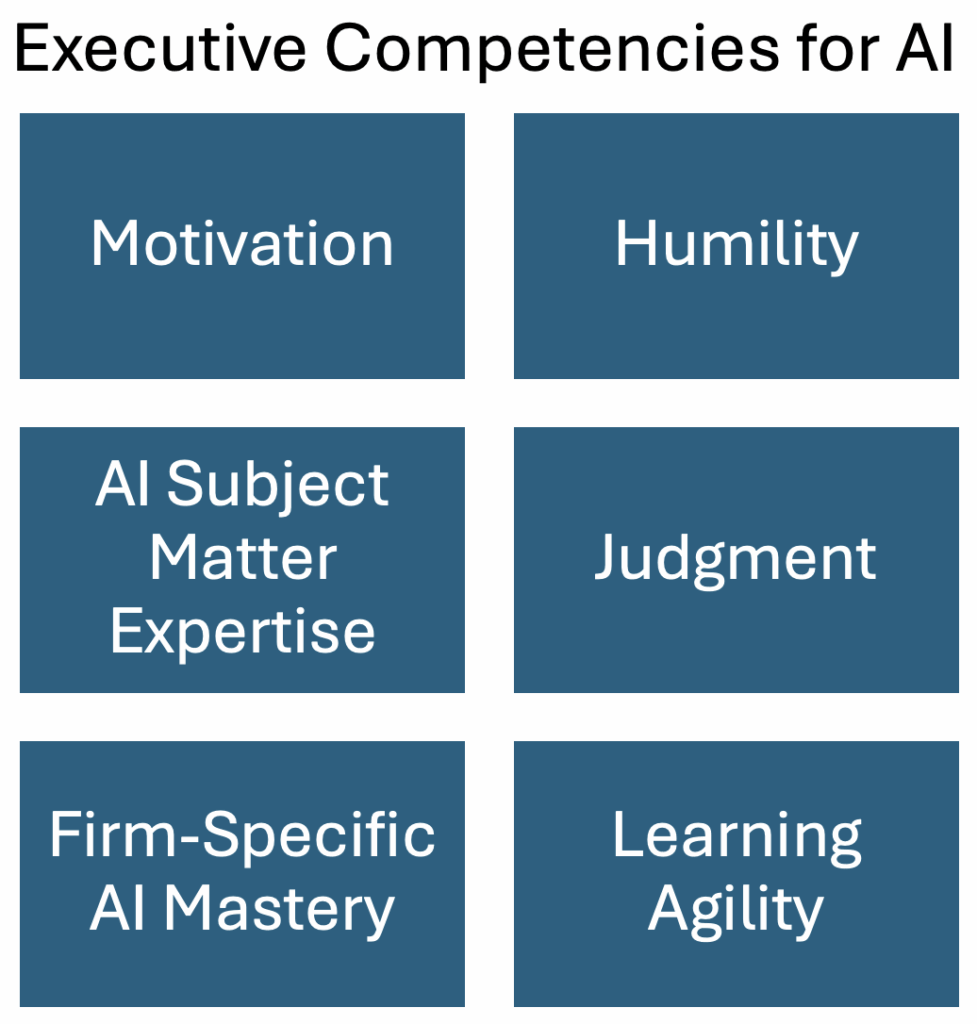The AI era is here, and the leaders who thrive will be the ones who build the right foundation early, starting with the executive competencies for AI. Yet most leaders are underestimating just how much this shift will reshape their role, their company, and the competitive landscape. Even among highly capable startup founders and enterprise executives, many haven’t meaningfully engaged with AI yet. They’re busy, skeptical, or unsure where to start.
Meanwhile, the leaders who are leaning in aren’t just learning how to use ChatGPT. They’re building new muscles. They’re developing the mental and strategic adaptability that will set them apart in a world that is changing faster than any quarterly plan can keep up with.
It’s not about becoming a technical expert. It’s about becoming a more adaptive leader. And that starts with identifying and strengthening the executive competencies for AI that will matter most in the months and years ahead.
Executive Competencies for AI That Matter Most Right Now

1. Motivation to Master AI: Begin With a Genuine Desire to Learn and Change
The beginning of AI mastery isn’t technical. It’s motivational. Leaders must start with a clear recognition that an historic shift is underway and that it will impact every aspect of how we lead, build, and compete.
This isn’t easy. AI adoption takes time, and there are always competing commitments. It’s tempting to delay or delegate it entirely. But the leaders who will thrive are the ones who choose to engage early, even when they feel behind.
Mastering the tools overnight isn’t the goal. What matters is having the drive to stay in the game. That internal motivation, paired with time and repetition, is what separates those who make real progress from those who stall out.
2. Humility: Show Up With a Beginner’s Mind
Humility might sound soft, but in this context, it’s one of the most practical and important capabilities a leader can have. AI tools are advancing so quickly that even experienced operators feel like beginners again. Being willing to look clumsy, ask basic questions, or post a rough experiment is uncomfortable. Still, it essential.
In Zen Mind, Beginner’s Mind, Shunryu Suzuki wrote, “In the beginner’s mind there are many possibilities, but in the expert’s mind there are few.” That mindset matters now more than ever. Leaders who approach AI with rigid expectations or fear of failure will get stuck. Those who adopt a beginner’s mind—open, curious, and unafraid to experiment—will learn faster and lead better.
Many leaders have built their careers on expertise. In this new cycle, expertise comes second to experimentation. You have to be open to trying things you don’t fully understand. That means leading from the front with a willingness to get it wrong before you get it right.
This is the same humility you ask from your teams when learning something new. Model it yourself, and you give permission for others to grow faster.
3. AI Subject Matter Expertise: Know the Landscape
You don’t need to be a prompt engineer or a researcher to lead effectively in this space. But you do need working knowledge of how AI systems operate and how they’re evolving.
What is each platform good at? ChatGPT tends to provide insight that I value, but it frustrates me when I need images generated. Gemini writes fluidly and searches for real-time content well. Claude plays it safe but often lacks substance. Each has strengths. Each has blind spots.
Beyond the platforms, understand how LLMs work at a high level. Know that they generate text by predicting what comes next, not by reasoning the way a human would. That distinction matters when you’re evaluating output and making decisions based on it.
Also keep an eye on what’s coming. Improvements in advanced reasoning abilities. The rise of AI agents that can perform multi-step tasks. The push toward more personalized, emotionally intelligent AI. The more you understand the landscape, the better your decisions will be.
4. Judgment: Trust, But Always Verify
AI doesn’t think. It predicts. That means it can generate useful outputs like summaries, drafts, or strategies. But it can also make things up, misinterpret data, or present something that sounds right but doesn’t hold up under scrutiny.
This is where judgment comes in. As a leader, you’re not just a user of AI. You’re its manager. You need to know when to delegate a task to it, when to review its work closely, and when to override the result.
You don’t need to be paranoid. However, you do need to stay alert. AI gives you leverage. Without judgment, that leverage can point you in the wrong direction.
5. Firm-Specific AI Mastery: Understand How AI Changes Your Business
It’s one thing to follow the latest trends in generative AI. It’s another to understand how those trends affect your company’s specific workflows, data, client interactions, and sources of competitive advantage.
This is firm-specific AI mastery. It’s your ability to understand how AI is transforming the way your organization creates value and how you apply it to your actual operating model.
In what areas could AI make you more efficient? Is it opening up new products or markets? Are there parts of your organization where people still spend hours on work that could be automated? And how will your business model need to evolve as those answers shift?
Generic AI literacy isn’t enough. You need to understand how the technology maps to your strategy, your customers, and your talent.
6. Learning Agility: Adapt Faster Than the Curve
The best leaders aren’t the ones with all the answers. They’re the ones who get better faster than everyone else. Learning agility is the ability to unlearn, re-learn, and create learning environments that pull others along with you.
At the core of learning agility is a growth mindset—the belief that your abilities can be developed through effort and feedback. Leaders with a growth mindset embrace challenges, persist through setbacks, and see learning as part of the job, not something to be outsourced. In contrast, a fixed mindset assumes that intelligence and capability are static. That mindset makes it harder to take risks, ask questions, or admit gaps in understanding. In an AI-driven environment where tools evolve weekly, the ability to learn on the fly is essential. Growth mindset gives you the psychological foundation to keep evolving instead of protecting what you already know.
You can’t just wait for the quarterly innovation summit or the annual exec offsite. You need lightweight, frequent learning loops. That might mean sandboxing AI pilots inside your team. It might mean testing a new tool every Friday. It might mean carving out 90 minutes a week to explore unfamiliar platforms and ask someone to walk you through how they’re using them.
The point isn’t mastery. The point is momentum.
The Future Belongs to the Adaptive
AI isn’t going to wait for leaders to catch up. If anything, the pace of change is still accelerating. What separates the leaders who thrive from those who get left behind isn’t IQ or technical fluency. It’s adaptability.
These six executive competencies for AI include motivation to master AI, humility, AI subject matter expertise, judgment, firm-specific AI mastery, and learning agility. They are not optional. They form the foundation for leadership in a world where the rules are being rewritten.
Which of the six are you strongest in today? And which one do you need to build next?
At KSE Leadership, we help companies assess and develop leaders who are ready for the demands of an AI-driven world. Whether you’re preparing for scale, succession, or transformation, we work with you to identify the competencies that matter most—and build them where it counts. If you’re ready to future-proof your leadership team, let’s talk.


Comments are closed for this article!